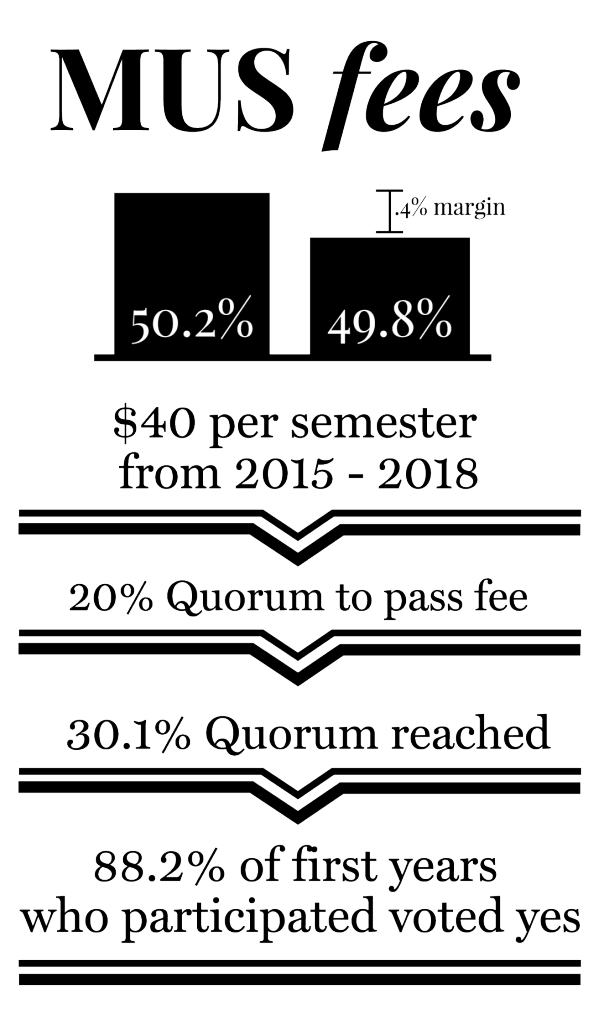Students of the Desautels Faculty of Management’s Undergraduate Society (MUS) voted on Feb. 5 to implement a $40 per semester non-opt-outable student fee for the next three years in a faculty-wide student referendum. The fee will go towards a new Bachelor of Commerce (BCom) Student Space Improvement fund. The fund is expected to accrue $500,000 by 2018 as a result of students’ contributions.
The referendum passed with 50.2 per cent voting “yes”, 49.8 per cent voting “no”. The voter turnout to the referendum was 629, representing 30.1 per cent of the total number of electors, surpassing its quorum of 20 per cent.
According to MUS President Sean Finnell, the motion was proposed by the MUS after a semester-long discussion and student survey on how Desautels could improve the spaces in which students work.
“After presenting a report to Desautels administration on potential improvements, the MUS realized how quickly and effectively they could be put in place if a vehicle was created where students were able to fund some improvements directly,” Finnell explained.
The new fund will be jointly managed by MUS and the Desautels Faculty of Management, and will not be related to the renovation of the bookstore space, where the faculty’s MBA program will be relocating in 2017.
Interim Dean Morty Yalovsky expressed that the establishment of the student fund would set a strong example for alumni to follow regarding raising funds for the renovation of the bookstore in the near future.
“This most recent student-led initiative will serve as a major catalyst for a new multi-million dollar alumni fundraising campaign, which will support BCom students’ infrastructure needs in Bronfman as well as planned renovations to the new building,” Yalovsky said.
Although no plans have been decided regarding the use of the fund, Finnell cited possible areas of improvement that would be made possible by the fund.
“An example would be completely overhauling our current fourth floor student space to increase the number of quiet individual study carrels in the building and substantially upgrading the group study area furniture—both are improvements widely demanded in our recent Student Space survey,” Finnell said.
The fee levy was met with mixed reactions. Some students felt that the fee was unnecessary and overly expensive.
“It’s good that they want to improve our life in Bronfman, but $80 per year is a lot,” said Marie-Valentine Pinton, U1 Management. “We may not even get to see the results of this fund, especially for those of us who only have two years left and will go on exchange. I just don’t think there’s a need for it.”
Others welcomed the fee, viewing it as an investment in their undergraduate education.
“The fund certainly presents a significant cost to individuals, but the success of the faculty ultimately reflects on us,” said Rosy Teed, U1 Management. “If this money is put towards improving our and future Desautels students’ learning, I think it’s worth it.”
According to Finnell, MUS launched a “Yes MUS!” campaign in support of the referendum question, which sought to inform students about the motion through social media in the Bronfman Building. Some Management students felt, however, that there was inadequate advertising for the new fee.
“I didn’t see the referendum question until I logged in to vote. I never saw any promotion about it,” Pinton said.
Although Teed supported the fee, she offered the same criticism.
“I had no idea about it until after the fact,” Teed said. “I feel like MUS could have been a bit more proactive in advertising as this is not the regular $2.50 fee increase.”
While Finnell acknowledged the points of contention regarding the fee, he maintained that the benefits outweigh the costs.
“Any new fee will meet resistance from certain individuals,” he said. “But I don’t think anyone can ignore the immense value Management students receive through current student-levied fees that help support our Career Centre and some of the specialized business technology and software exclusively available to B.Comms.”









